Friendly disclaimer! We want to be as accurate as possible, but given these challenging times, we urge you to recheck that the venues are open when you decide to visit.
Delhi is a thoroughly inscrutable onion of a city; every layer you peel off reveals an even deeper layer of history. Rebuilt eight times by its many conquerors, it has been the seat of the Hindu, Muslim, and British empires, all of whom have left their mark in the architecture, customs, food, and people of this relentless capital city.
The National Museum
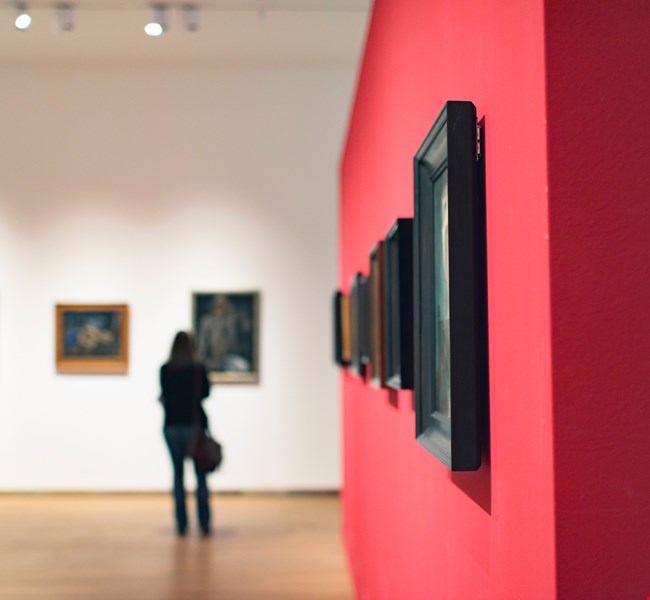
Situated in the heart of New Delhi, the National Museum holds exhibits throughout Indian history, including relics of the Indus Valley civilisation, sculptures from the Mauryan civilisation, South Indian Vijayanagar artefacts and a Buddhist gallery, representing a cultural centre and a treasure of immeasurable value.
Useful Info:
- Location: Janpath Rd, Rajpath Area, Central Secretariat, 110011
- Website: www.nationalmuseumindia.gov.in
- Timings: Tuesday – Sunday 10 am to 6 pm
- How to reach: By the nearest underground stations, Central Secretariat and Udyog Bhawan
Gurudwara Bangla Sahib
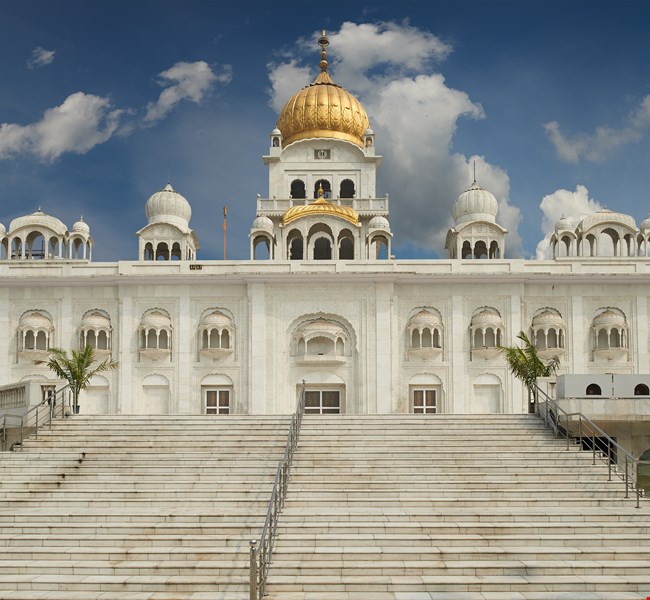
The most outstanding Sikh house of worship in town, Gurdwara Bangla Sahib boasts stunning architectural features and a characteristic golden dome. Located near Connaught Place in the centre of New Delhi, it welcomes people of every status and faith.
Useful Info:
- Location: Gurudwara Bangla Sahib, Hanuman Road Area, Connaught Place
- Website: www.dsgmc.in
- Timings: Every day 12 am to 12 pm
- How to reach: Nearest station, New Delhi Train Station
Akshardham Temple

A major draw for tourists, the Swaminarayan Akshardham temple has a peculiar charm and an architectural structure that enchants Indians and travellers alike. The beautiful gardens exhale more than 10,000 years of Indian culture in a magical show of India’s greatness.
Useful Info:
- Location: National Highway 24, Near Noida More
- Website: www.akshardham.com
- Timings: Every day 9.30 am to 6.30 pm
- Other info: A strict dress code operates throughout the complex: knees, chest and shoulders must be covered
Lodhi Gardens
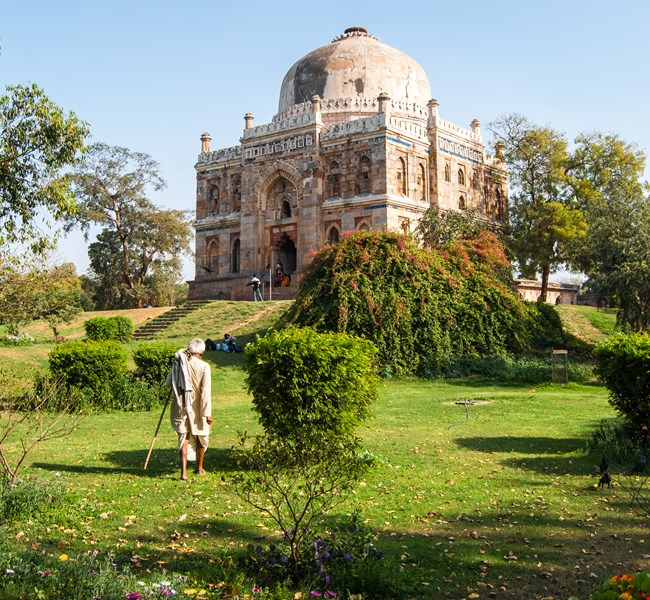
An idyllic escapade in the city centre, the park is a green oasis gifted with some stunning constructions dating back to the 15th century, wonderful tombs mosques and elegant bridges. The great contrast with the bustling city is a welcome change, offering a perfect solution for a relaxing stroll.
Useful Info:
- Location: Lodi Road, Lodhi estate
- Website: www.ndmc.gov.in
- Timings: Every day 6 am to 7.30 pm
- How to reach: Nearest station, JLN Metro Station
National Gandhi Museum
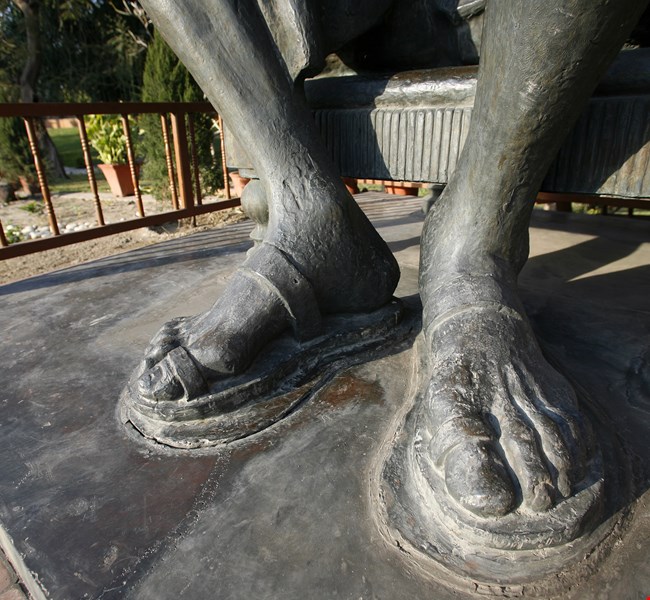
The National Gandhi Museum has numerous exhibits depicting the life of Ghandi and the history of India. Going back to 1948 when his assassination took place, the exhibition intends to give a fresh insight into the life of the leader of the Indian independence movement and his non-violent opposition and philosophy.
Useful Info:
- Location: Rajghat, New Delhi
- Website: www.gandhimuseum.org
- Timings: Tuesday to Sunday 9.30 am to 5.30 pm
Sulabh International Museum of Toilets

Handling something as unusual and amusing as toilets, Sulabh International Museum integrates some bizarre exhibits with a matter of fundamental importance in India such as sanitation. Founded by Dr. Bindeshwar, an inspiring personality who strongly contributed to integrate untouchables, it aims to educate about sanitation and its development throughout the years.
Useful Info:
- Location: Sulabh Bhawan, Palam Dabri Marg, Mahavir Enclave, Palam
- Website: www.sulabhtoiletmuseum.org
- Timings: Monday – Saturday 8 am to 8 pm, Sunday 10 am to 5 pm
National Gallery of Modern Art

The National Gallery of Modern Art houses some of the world’s largest exhibitions, boasting thousands of Modern Art works made by Indian iconic artists. Located on the Rajpath near the India Gate, it offers some beautiful gardens where to relax after an intensive journey through India’s modern history.
Useful Info:
- Location: Jaipur House, C-Hexagon Road, India Gate
- Website: www.ngmaindia.gov.in
- Timings: Tuesday – Sunday 11am to 6.30pm
Sunder Nursery

The recently inaugurated green oasis (the Indian capital’s version of Central Park) features Delhi’s first arboretum, with multiple species of trees (including a Bonsai House), plants, birds and butterflies. Mughal architecture dating back to the 16th century still remains on park grounds, along with the adjacent Humayun’s Tomb. The city zoo is not too far from here; future plans include linking the two to one another to create one vast recreational expanse.
Useful Info:
- Location: Hazrat, Nizamuddin, New Delhi
- Website: www.sundernursery.org
- Timings: Daily 7 am to 7 pm
The Garden of Five Senses
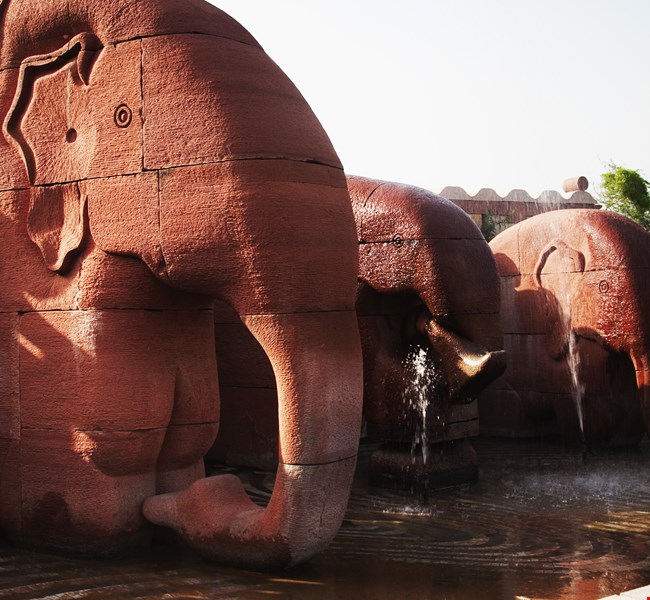
In the city’s hustle lies The Garden of Five Senses, a treasure of over 20 acres where tranquillity and serenity reign. The garden was designed to awaken the five senses with its indescribable beauty and breathtaking attractions. At the Garden of Five Senses you will find a replica of the Mexican Mayan Labná Arc, unique sculptures of children praying, stone crafted elephant troop, well-lit fountains, and more. Cultural festivals, including the Dandiya festivals, the Garden Tourism Festival, food festivals, and more are held here around the year.
Useful Info:
- Location: Westend Marg, Saidulajab, Saiyad ul Ajaib, Saket
- Timings: Every day 9 am to 7 pm
Bahai Lotus Temple
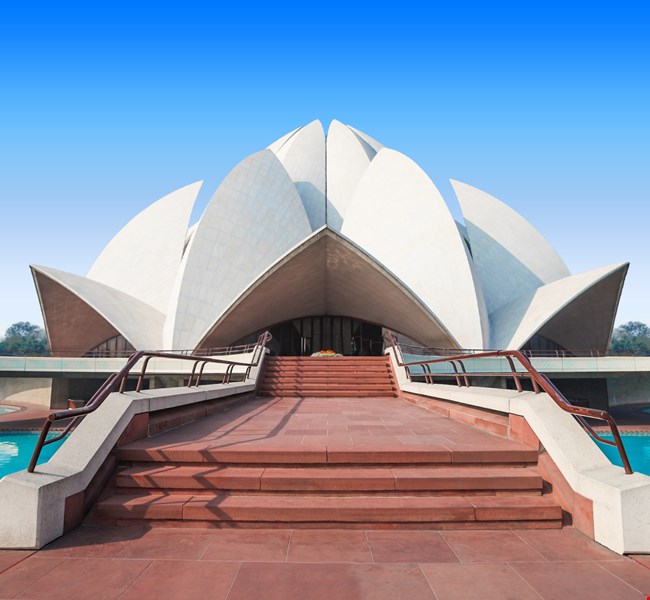
Finished in 1986, the Lotus Temple welcomes everyone, regardless of religious beliefs or background. Although no sermons are delivered nor ritualistic ceremonies practiced, the serenity of the environment offers a great meditation spot and a shady garden to escape to.
Useful Info:
- Location: Lotus Temple Rd, Bahapur, Shambhu Dayal Bagh, Kalkaji
- Website: www.bahaihouseofworship.in
- Timings: Winter 9 am to 5:30 pm, Summer 9 am to 7 pm
The Red Fort

A pinnacle of Delhi’s Mughal architecture, the Red Fort stands near the Yamuna River in Old Delhi with its sandstone walls glowing red in the sun. A perfect example of pre-British Islamic Indian architecture, the Fort still exudes the power and majesty of those times, representing a world heritage of immeasurable beauty.
Useful info:
- Location: Netaji Subhash Marg, New Delhi
- Website: asi.nic.in
- Timings: Tuesday – Sunday 9.30 am to 4.30 pm
Qutub Minar
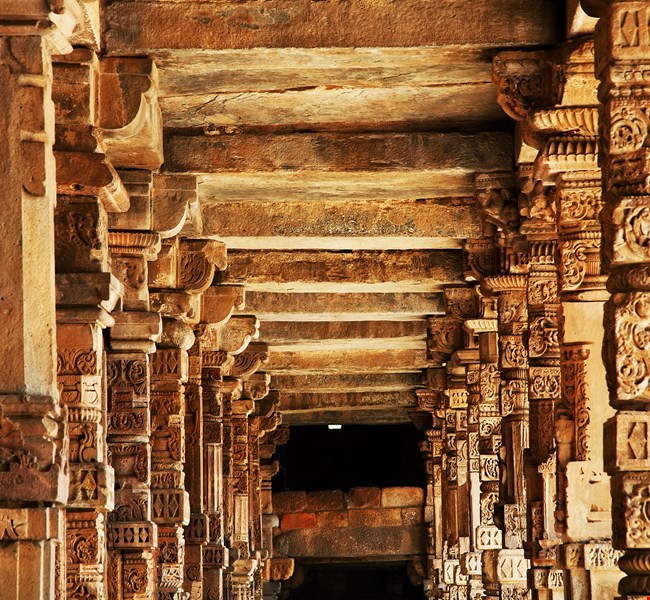
A tapering tower located south of New Delhi, Qutub Minar rises on a UNESCO World Heritage Site and one of the finest examples of the Afghan architecture that sprang up in the Islamic India from 1193. Thought to be a victory tower, it is said to be constructed to celebrate the beginning of the Muslim domination in India and, with the Qutub Complex, it is a grand display of the long lost majestic era.
Useful Info:
- Location: Mehrauli, New Delhi
- Website: www.qutubminar.org
- Timings: Every day 7 am to 5 pm
- How to reach: Closest station, Qutub Minar station
Jama Masjid
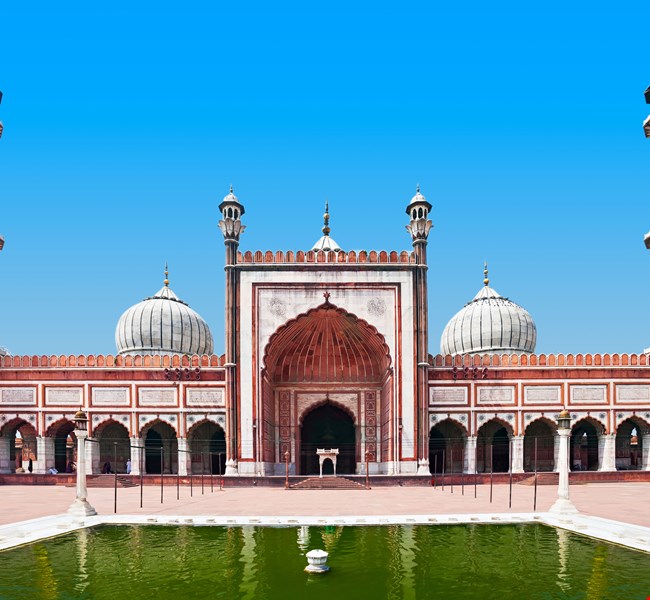
The Jama Masjid was built by the Islamic ruler Shah Jahan to complement his new Red Fort. Completed in 1658 as the largest mosque in India, it boasts a stunning courtyard that provides space for 25,000 worshipers as well as a vast dome and two minarets.
Useful Info:
- Location: Jama Masjid Rd, Jama Masjid, Chandni Chowk
- Timings: Every day 7 am to 12 am / 1.30 pm to 6.30 pm (Tourists are not allowed during prayer hours)
- How to reach: Metro station, Chawri Bazaar
Taj Mahal

Another incredible UNESCO treasure, this majestic construction is an early example of the exquisite Islamic style that reached its culmination in the most famous tomb on earth, the Taj Mahal. Dating back to the 1632, the ivory-white mausoleum was built to house the tomb of the Mughal emperor’s favourite wife and it is located in Agra, a city on the banks of the river Yamuna. A trip to Agra makes for a good day excursion from Delhi.
Useful Info:
- Location: Agra
- Website: www.tajmahal.gov.in
Chandni Chowk
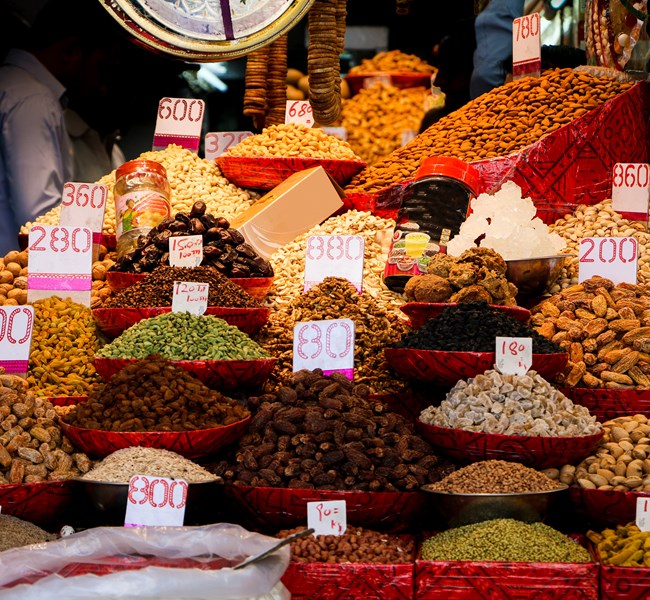
Running from the Fatehpuri Masjid (mosque) in the West to the Red Fort in the East, Chandni Chowk is the main artery of Old Delhi. It is the most crowded, colourful and cacophonous bazaar in the whole of Delhi, a wonder to delve into by rickshaw and where anything, from knickknacks to delicious street food, can be found.
Useful Info:
- Location: Chandni Chowk, New Delhi
- Timings: Monday – Saturday 10 am to 7 pm
Purana Quila (Old Fort)
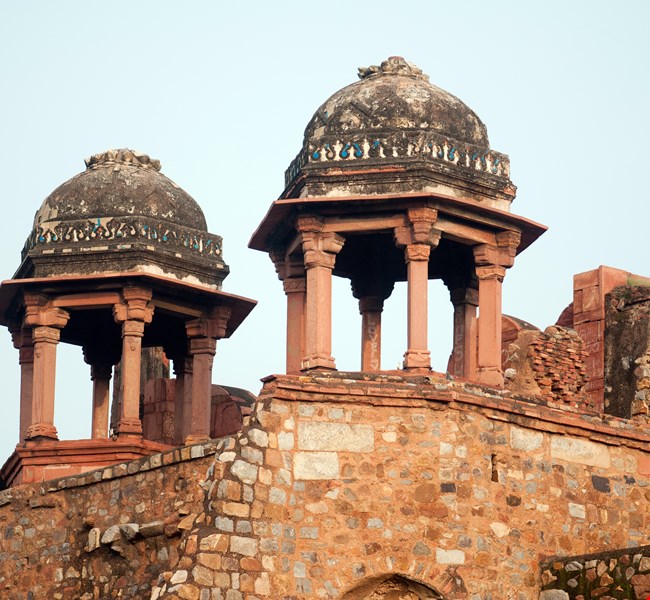
Purana Quila (Old Fort), a massive fortress with three gateways, is located on the ancient part of the city. It allegedly stands on the site of the legendary city of Indraprastha, mentioned in the Mahabharata Hindu text. The fort was completed by the ruler Sher Shah in the mid-16th century.
Useful Info:
- Location: Indraprastha Purna Qila, Pragati Maidan
- Timings: Every day 7 am to 5 pm
- How to reach: Nearest Metro Station, Pragati Maidan
Connaught Place

This is the epicentre of the vision drawn up by the architect Edwin Lutyens when the British built a new imperial capital at Delhi in 1911. The colonnaded double circle of Connaught Place has a classical European air, with seven streets radiating from it.
Useful info:
- Location: Connaught Place, New Delhi
- How to reach: Nearest Metro station, Rajiv Chowk





